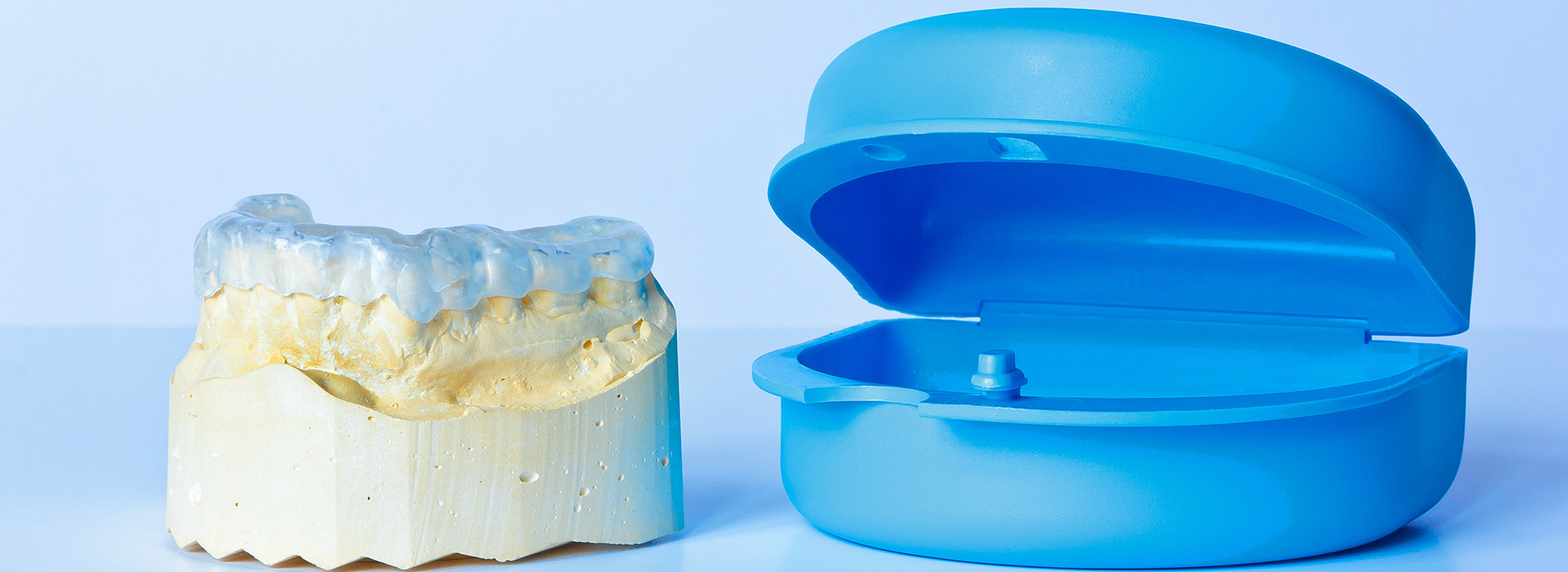
Bruxism is the medical term for clenching or grinding the teeth, and although it can occur during the day, it most often happens during sleep. Nighttime grinding is commonly noticed when patients wake with a sore jaw, morning headaches, or teeth that feel unusually sensitive. Because the activity occurs outside of conscious control, many people don’t realize they grind until a partner notices the sound or a dentist identifies wear on the teeth.
Several factors can contribute to bruxism. Psychological stress and anxiety are frequent triggers, but sleep disturbances, certain medications, and structural issues in the bite can also play a role. Habits such as smoking or excessive caffeine intake may increase the likelihood of nighttime clenching, while obstructive sleep problems can change jaw muscle behavior and lead to persistent grinding.
Left unaddressed, bruxism can produce a range of consequences: worn tooth enamel, cracked or chipped teeth, and soreness in the jaw muscles and temporomandibular joint (TMJ). For many patients, the first step toward protecting oral health is recognizing the signs early and discussing treatment options with a dental professional, who can recommend strategies to reduce muscle strain and protect the teeth during sleep.
A night guard is a simple, purpose-built appliance that sits over the teeth while you sleep. Rather than stopping the jaw muscles from working entirely, it creates a protective layer between the upper and lower teeth so direct grinding forces no longer damage enamel. This barrier also helps distribute bite pressure more evenly, which can reduce stress on the TMJ and ease muscle tightness that contributes to morning discomfort.
Night guards come in different designs and materials to suit varying degrees of bruxism and patient preferences. Some are softer and more forgiving for mild clenching, while others are made from firmer acrylics for heavier grinding. A custom-fitted guard from a dental office is crafted to match your bite precisely, which improves comfort and reduces the likelihood of broken or loose restorations.
Beyond immediate protection, wearing a properly fitted night guard can interrupt destructive habits and create a safer environment for restorative work. It is an important preventive tool for patients who want to protect existing dental work—such as crowns or veneers—and preserve natural tooth structure over the long term.
When you pursue a custom night guard, the process begins with a clinical evaluation. Your dentist will examine teeth, note signs of wear, and assess jaw movement and the condition of the TMJ. This evaluation helps determine whether a night guard alone is the right choice or if additional treatments or referrals are needed to address contributing factors like a misaligned bite or sleep disorder.
Impressions or a digital scan of your teeth are then taken to create a precise model of your bite. This allows a dental laboratory or in-office milling system to fabricate an appliance tailored to your anatomy. At your fitting appointment, the dentist adjusts the guard so it seats comfortably and maintains a stable bite; small refinements are common and help ensure the device remains secure through the night.
Most patients notice a short adjustment period as they get used to wearing the appliance. Minor changes in speech or increased saliva are normal at first and usually resolve within days. Follow-up visits are a routine part of care so your dentist can confirm the fit, make any necessary modifications, and evaluate whether the guard is accomplishing its protective goals.
Proper care extends the life of a night guard and keeps it hygienic. Rinse the appliance with cool water after each use and gently brush it with a soft toothbrush—avoid abrasive toothpaste that can scratch the surface. When not in use, store the guard in its ventilated case to reduce exposure to bacteria and accidental damage. Regular cleaning of the case itself is also helpful.
If you notice changes in the fit, persistent discomfort, or signs of excessive wear, schedule an appointment with your dentist. A guard that no longer fits correctly can lose its protective benefits and may need to be adjusted or remade. Avoid attempting do-it-yourself modifications; do-it-yourself adjustments can create uneven contacts and even increase stress on teeth and the TMJ.
Occasional repairs or replacements are a normal part of long-term use. A well-maintained custom night guard can last several years, depending on the intensity of grinding and the material used. Keeping a record of symptoms and noting any new aches or noises in the jaw can help your dental team monitor progress over time and decide when a replacement is needed.
For many patients, a night guard is an effective and immediate step toward protecting dental health, but it can also be part of a larger, multidisciplinary approach. If bruxism is linked to stress, behavioral strategies and relaxation techniques may be recommended alongside the guard. In situations where a sleep disorder is suspected, your dentist may advise evaluation by a sleep specialist to address underlying causes.
Some patients with complex bite problems, existing restorations, or TMJ disorders benefit from coordinated care that includes orthodontics or other dental specialties. In those cases, the night guard can protect teeth while long-term solutions are planned and executed. Communication between providers ensures that any adjustments to the bite or restorative work consider the patient’s bruxism and appliance needs.
At our office in North Hollywood, we aim to provide balanced, evidence-based recommendations that address both symptoms and root causes. A personalized plan helps patients manage grinding now while protecting oral health for the future. If you are experiencing the signs of bruxism, discussing a night guard with a dental professional is an excellent first step.
In summary, night guards are a practical, minimally invasive way to protect teeth and jaw joints from the effects of nighttime grinding. They reduce wear, ease muscle strain, and can be tailored to your specific needs through a custom fitting. If you’d like more information about how a night guard could help you or want to schedule an evaluation, please contact us for more information.
